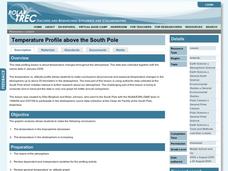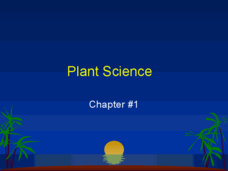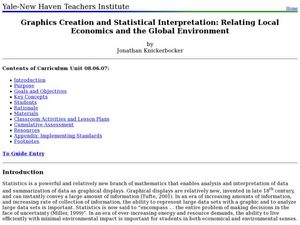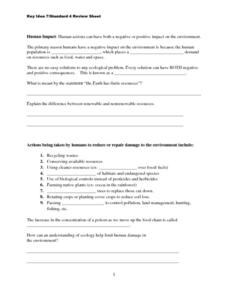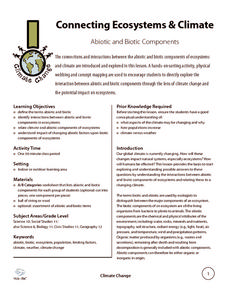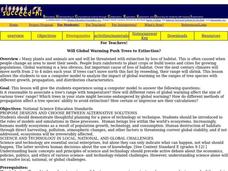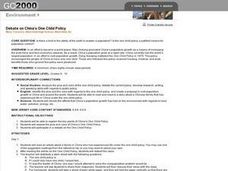Curated OER
U.S. Population Hits 300 Million
Students read a story about the population in the United States reaching 300 million, and answer vocabulary and comprehension questions about it. In this population lesson plan, student respond to literature by answering questions,...
Polar Trec
Temperature Profile above the South Pole
Collecting and understanding data is a big part of understanding the world and how it changes. To better grasp what temperatures are changing and how they affect global populations, learners create a graph based on the date provided....
Curated OER
Plant Science Chapter #1
It may not stand as a cohesive presentation, but individually you may find a use for these slides. One slide describes how civilization began once man learned to plant and harvest food. Another explores the population growth over time....
Global Oneness Project
Deconstructing Consumerism
To increase awareness and launch a discussion of consumerism, class members view What Would It Look Like, a 25 minute film of images that capture the global effects of the consumption of goods. Viewers make a list of the images that they...
Kenan Fellows
Attack of the Aphids!
Insects threaten the food production industry, and aphids are one of the big players! Analyzing data of aphid populations gives insight into their behaviors. Learners model the population data of an uninhibited population with an...
Curated OER
Graphics Creation and Statistical Interpretation: Relating Local Economics and the Global Environment
Students apply statistics, and graphical interpretation to economics, the environment and populations. In this statistical lesson plan students construct graphical displays and classify data.
Curated OER
Standard 4 Review-Human Impact
In this human impact on the environment worksheet, students fill in the blanks to complete sentences about how humans have negatively affected the environment. They complete sentences about the actions taken to reduce and repair the...
Curated OER
World in the Balance
Young scholars make estimates on how many people they believe live on Earth. While watching a video, they take notes on the issues facing Kenya, Japan and India. In groups, they calculate how long it takes for a country to double in...
Curated OER
How Does the Loss of Ozone Affect Our Climate
Students explore the greenhouse effect and what it does to the environment. They discuss if and how human behavior contributes to global warming and test natural materials for carbon content.
Wild BC
Connecting Ecosystems & Climate
Collaborators sort a set of cards into biotic and abiotic categories. Then, as a class, they discuss their work and relate each of the abiotic components to climate change. Finally, they form a web of components by connecting those that...
Curated OER
Our Population and Its Impact on the Planet
Students explore environmental problems due to the growing worldwide human population and examine the growth rate. They also discuss possible ways to stabilize population growth and increase sustainable development.
Curated OER
Population Growth
Students investigate the biodiversity of living things and how they are interdependent upon each other. They conduct research using a variety of resources. Specifically students create a graph to show how a population can grow in an...
Curated OER
Water Pressure - Disparity of Resources
Students examine the disparity of resources between developing and industrialized nations, and research the problem of water availability as world populations increase and natural resources are stressed.
Curated OER
Lesson 3: Understanding Population Growth
Students explain population growth in Maryland and its relationship with age structure, household growth and consumption of land.
Curated OER
Will Global Warming Push Trees to Extinction?
Young scholars examine the extinction of plants and animals through loss of habitat. They investigate the effects of global warming. They use a computer model to analyze the impact of global warming on tree growth and distirbution...
Population Connection
A Demographically Divided World
Did you know that birth and life rates vary across the world? The resource, the second in a six-part series, discusses just how demographics differ across countries and why it might be the case. Scholars complete worksheets, watch...
Wild BC
Bearly Any Ice
After reviewing food chains, your class members participate in an arctic predator-prey game that exemplifies the impact of climate change of food availability. If you are in a hurry, skip this lesson, but if you have the time to...
Workforce Solutions
Miniature Gulf Coast Project
Scholars show what they know about data collection and analysis with an activity that examines a smaller population of Houghton, Texas. Independently or in pairs, learners identify their research question, gather, graph, and analyze...
National Wildlife Federation
I Speak for the Polar Bears!
Climate change and weather extremes impact every species, but this lesson focuses on how these changes effect polar bears. After learning about the animal, scholars create maps of snow-ice coverage and examine the yearly variability and...
Population Connection
The Human-Made Landscape
Agriculture, deforestation, and urbanization. How have human's changed the planet and how might we mitigate the effects of human activity on the planet? To answer these questions class members research the changes in human land use from...
Curated OER
The State of the Planet
Students address four different environmental topics (water issues, the threat of food shortages, human population growth, and global warming) as they watch a film and discuss the future of the earth. In groups, they complete various...
Curated OER
Maintaining Strong Fisheries
Learners play a game about the life cycle of a blue crab in order to witness the causes of changes in the crab population and discuss what a resource manager could do to keep a stable crab population. Students then create a game titled...
Curated OER
Going Global
Students describe the importance of aquaculture as a source for protein intake by humans globally. They are given a number from 1-3 as they enter the class. All "1's" recieve 10 beans. All "2's" recieve 5 beans. All "3's" recieve 1 bean....
Curated OER
Debate on China's One Child Policy
High schoolers learn about China's One Child Policy. They read an article about a specific family's experience under the policy (not included) and research and explain the key points of the policy. They assess the pros and cons in a...



